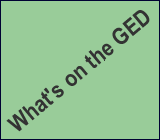

 |
 |
|
|
ARTICLES:
|
 The 2002 GED Test is made up of the five tests in the GED battery. The 2002 GED Test is made up of the five tests in the GED battery.
The GED will continue to measure the outcomes of a four year program of secondary school education in the United States and Canada. Created by educators and specialists in each of the given subject areas, the tests were administered to graduating high school seniors to establish the passing standard. Individual states and provinces may set a passing standard higher than, but not lower than the standard set by the Testing Service. The 2002 Series continues to follow the purpose of providing a basis for conferring a high school equivalency diploma on those adults who have not graduated from a traditional high school. The 2002 Series Tests use the most up-to-date high school curriculum standards and assessment practices available. As with the previous Tests, the 2002 Series covers the academic areas of language arts, math, science, and social studies. Data gathered last fall and this spring will provide the basis for any further development of the 2002 Series. The new tests will feature changes from the previous series and reflect the impact of welfare-to-work legislation with an emphasis on academic achievement in the K-12 community. GED candidates should encounter real-life scenarios across the five tests. The Language Arts section will feature an increased emphasis on organization and implements a new scoring scale. On the Language Arts Reading Test, candidates will be asked to read and interpret fiction and nonfiction, prose, poetry, and drama from a wide variety of cultures and time periods. The 2002 Mathematics Test is given in two parts. The first part of then test allows the use of a calculator. The second part does not. Candidates must complete both parts of the test in order to receive a score. All GED candidates may use the Casio fx-260 Solar calculator and will be given an opportunity to practice with it before the test begins. On the new Social Studies Test, test-takers should expect to see at least one excerpt from such historical works as the Declaration of Independence, the Federalist Papers, the United States Constitution, or a landmark Supreme Court decision. The 2002 GED Science Test, calls upon a National Education framework, asking candidates to select the best way to set up experiments, interpret results, apply scientific conclusions, analyze experimental flaws, and use the work of renowned scientists to explain the scientific issues involved. Still, one questions remains. Where are we with this process? The GEDTesting Service is presently gathering field-tested test questionaires and compiling the data to provide the basis for the further development of the 2002 Test Series. At present, the new test is scheduled to begin use on January 1, 2002.
GED Language Arts Writing Test Part II GED students often lack confidence, experience, and skills for writing essays. Part of the problem lies in the fact that most GED students do not write on a regular basis. They don’t write at home. They don’t write in the workplace. But writing is a skill that requires regular practice. In this section of the web-based training, you will have an opportunity to learn about the four-point scoring guide developed by the GED Testing Service
GED Preparation and Information The General Educational Development (GED) Test covers five (5) areas:
GED Practice Tests are offered to predict success on the official GED Test.
|